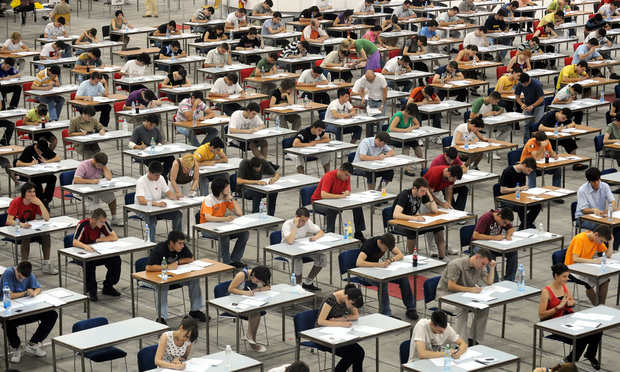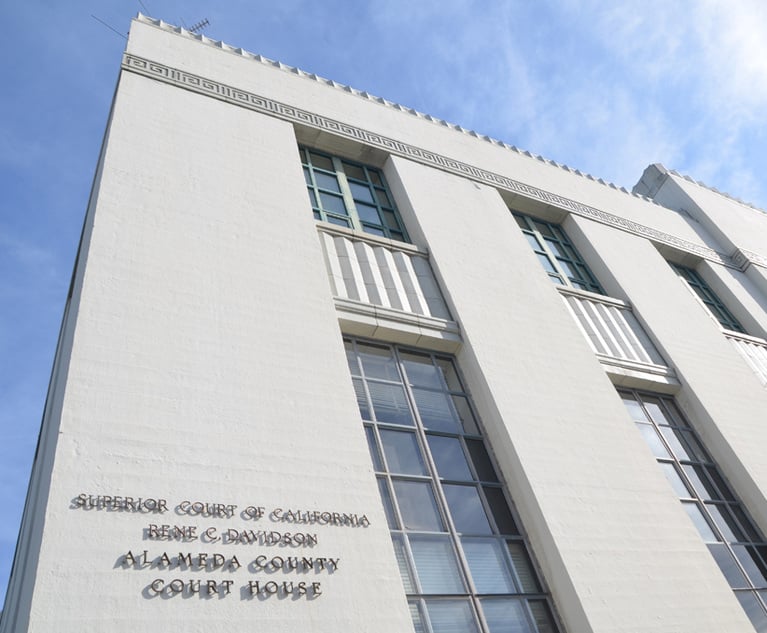Report Reveals Frantic Scramble After California Bar Exam Blunder
A 19-page report prepared by Nielsen Merksamer Parrinello Gross & Leoni found that a bar staffer, pressured to finish work before having to proctor the two-day exam in July, mistakenly included a list of topics in an email inviting 16 law school deans to observe a test grading session later that summer.
November 13, 2019 at 11:52 AM
8 minute read
 Test-takers hard at work.
Test-takers hard at work.
Updated at 3:04 p.m.
Inadvertent human error led California's state bar to erroneously disclose essay topics on the July 2019 bar exam six days before the test's administration, a report commissioned by the California Supreme Court concluded.
A 19-page report prepared by Nielsen Merksamer Parrinello Gross & Leoni found that a bar staffer, pressured to finish work before having to proctor the two-day exam in July, mistakenly included a list of topics in an email inviting 16 law school deans to observe a test grading session later that summer. The report redacts the names of those bar staffers directly involved with the erroneous release.
Beyond the initial disclosure, the report found the bar's harried response reflected an agency ill-prepared to handle an administrative emergency and unclear on expectations from the California Supreme Court. Bar leaders did not consult with Supreme Court justices before deciding to provide the exam topics to every applicant registered to take the test, investigators found.
"Presently, the Supreme Court has been more active and engaged in overseeing the State Bar than it has in the past," said the report, signed by Nielsen Merksamer attorney and former state appellate justice Arthur Scotland. "It is readily apparent that some at the State Bar have not adapted well to this enhanced oversight."
Scotland singled out bar general counsel Vanessa Holton for being "at times recalcitrant during her interview" with the Nielsen Merksamer investigators.
Both Holton and state bar executive director Leah Wilson said the agency's relationship with the California Supreme Court had grown "more adversarial" since Sunil "Neil" Gupta became the chief justice's principal attorney and the primary conduit between the court and bar trustees in late 2018, according to the report.
"The court looks forward to working with the State Bar to develop protocols that establish more awareness of and improved communications with the court in an emergency situation," said Cathal Conneely, the state Supreme Court's public information officer.
Alan Steinbrecher, chairman of the State Bar Board of Trustees, said in a statement issued Wednesday afternoon:
"The early release of topics on the July 2019 California Bar Exam was an unprecedented situation, and the decisions that were made to level the playing field for all exam takers erred on the side of fairness and transparency. The Nielsen Merksamer report summarizes several concrete measures that the State Bar is already taking to prevent such occurrences in the future, and I am confident in staff's efforts to implement the necessary changes. The report highlights the vital importance of the Supreme Court's oversight and engagement; we welcome guidance from the Court on how best to move forward with the report's broader recommendations."
The state bar retained outside counsel in August to investigate the exam blunder. The bar has yet to make those findings public, although the Nielsen Merksamer report references its contents.
The Nielsen Merksamer report details a frantic set of calls, texts and emails among bar leaders in late July. Jay Frykberg, dean of the University of West Los Angeles School of Law, discovered on July 27, a Saturday, that the email invitation he had received from the bar earlier that week included exam topics.
Wilson had recused herself from matters involving the exam because her son was an applicant. So had Amy Nuñez, the bar's head of admissions, because of her friendship with Wilson and Wilson's son. The task of handling the bar's response fell to Donna Hershkowitz, the chief of programs, who was on vacation.
What followed were several hours of phone conversations and emails among Hershkowitz, several bar trustees and Holton. Those communications were hampered at times by problems with bar email accounts and the distance among participants who had been enjoying the weekend before the notification of the errant disclosure.
Hershkowitz presented three options: provide the exam topics to everyone registered for the test; ask the deans who received the emails if they had shared the contents with anyone; or do nothing. Hershkowitz and three trustees, including board chairman Jason Lee, decided to send an email to test-takers explaining what had happened and telling them what the essay topics would be.
"Ms. Hershkowitz explained the decision to disclose the topics to all exam participates was a combination of the State Bar's loss of control over the information, the desire to level the playing field for all exam takers, the unwillingness to tolerate that any exam takers might have an advantage, and the sense of urgency to make a decision," the report said.
Lee asked Hershkowitz to send him a draft of the email and to contact an unnamed reporter "on background" and to alert Gupta.
"Consistent with the decision to 'alert' the Supreme Court as an 'FYI' but not invite the Court's participation in 'the decision making [the State Bar was] engaging in,' Ms. Hershkowitz's email to Mr. Gupta did not ask for his or the Court's input into the decision to publish the exam topics to all exam participants," the report said.
Around 6:30 p.m., Holton joined the message exchanges, advising Hershkowitz "to try to get our psychometrician's opinion for cover." On Sunday, July 28, Hershkowitz told The Recorder that bar officials had consulted with the psychometrician, or testing expert, before deciding to reveal the topics to approximately 9,000 registered test-takers.
After he was notified, Gupta began peppering Hershkowitz with emails questioning the plan to go public with the disclosure. "A mistaken email to 16 persons is much different than a mea culpa to hundreds of bar applicants. One is a quiet mistake, the other is a loud one," Gupta wrote, according to the report.
No one responded to Gupta's emails for about three hours. The bar's email was sent to test-takers around 9 p.m. Saturday. Gupta had tried to obtain a draft of the message before that but did not see it until the chief justice's assistant supervising attorney found it on Twitter.
In an interview with the Nielsen Merksamer team, Alan Steinbrecher, vice chairman of the board of trustees, said he didn't think the Supreme Court would expect to weigh in on handling the crisis. "In sum, he thought the court would have expected the bar 'to take care of this problem in real time and keep them informed,'" the report said.
Recommendations
In response to the events, the bar has changed various forms and practices to ensure that information about exam topics is not sent to law school deans until after the test is over. Bar officials have also said they will provide additional staff training before the February 2020 bar exam on the testing process and the confidentiality of related materials.
"We also recommend the State Bar consider addressing the shortage of bar exam proctors," the report said. "This shortage placed the Admissions office staff under pressure, leading to the shortcut in procedures that produced the inadvertent disclosure."
The report also noted that bar executives and trustees agreed that the agency needs a better system in place for addressing emergencies.
The bar is scheduled to release the results of the July 2019 bar exam on Friday.
Read the Nielsen Merksamer report on the state bar blunder:
Read more:
Supreme Court Hires Former Appellate Judge to Review Exam Blunder
With Confusion Swirling Over Bar Exam Blunder, Officials Vow to Investigate
California Bar 'Inadvertently' Reveals Essay Topics Days Before Exam
How Law Schools Fared on California's February 2019 Bar Exam
Nearly 7 in 10 Flunked California's February 2019 Bar Exam
This report was updated with comment from the state bar.
This content has been archived. It is available through our partners, LexisNexis® and Bloomberg Law.
To view this content, please continue to their sites.
Not a Lexis Subscriber?
Subscribe Now
Not a Bloomberg Law Subscriber?
Subscribe Now
NOT FOR REPRINT
© 2025 ALM Global, LLC, All Rights Reserved. Request academic re-use from www.copyright.com. All other uses, submit a request to [email protected]. For more information visit Asset & Logo Licensing.
You Might Like
View All

Fresh lawsuit hits Oregon city at the heart of Supreme Court ruling on homeless encampments
4 minute read

Trending Stories
- 1Morris Nichols Partners to Be Involved With PLI Program
- 2How I Made Practice Group Chair: 'Cultivating a Culture of Mutual Trust Is Essential,' Says Gina Piazza of Tarter Krinsky & Drogin
- 3People in the News—Feb. 3, 2025—Antheil Maslow, Kang Haggerty, Saxton & Stump
- 4Patent Pending ... and Pending ... and Pending? Brace Yourself for Longer Waits
- 5Indian Law Firm Cyril Amarchand Rolls Out AI Strategy, Adopts Suite of AI Tools
Who Got The Work
J. Brugh Lower of Gibbons has entered an appearance for industrial equipment supplier Devco Corporation in a pending trademark infringement lawsuit. The suit, accusing the defendant of selling knock-off Graco products, was filed Dec. 18 in New Jersey District Court by Rivkin Radler on behalf of Graco Inc. and Graco Minnesota. The case, assigned to U.S. District Judge Zahid N. Quraishi, is 3:24-cv-11294, Graco Inc. et al v. Devco Corporation.
Who Got The Work
Rebecca Maller-Stein and Kent A. Yalowitz of Arnold & Porter Kaye Scholer have entered their appearances for Hanaco Venture Capital and its executives, Lior Prosor and David Frankel, in a pending securities lawsuit. The action, filed on Dec. 24 in New York Southern District Court by Zell, Aron & Co. on behalf of Goldeneye Advisors, accuses the defendants of negligently and fraudulently managing the plaintiff's $1 million investment. The case, assigned to U.S. District Judge Vernon S. Broderick, is 1:24-cv-09918, Goldeneye Advisors, LLC v. Hanaco Venture Capital, Ltd. et al.
Who Got The Work
Attorneys from A&O Shearman has stepped in as defense counsel for Toronto-Dominion Bank and other defendants in a pending securities class action. The suit, filed Dec. 11 in New York Southern District Court by Bleichmar Fonti & Auld, accuses the defendants of concealing the bank's 'pervasive' deficiencies in regards to its compliance with the Bank Secrecy Act and the quality of its anti-money laundering controls. The case, assigned to U.S. District Judge Arun Subramanian, is 1:24-cv-09445, Gonzalez v. The Toronto-Dominion Bank et al.
Who Got The Work
Crown Castle International, a Pennsylvania company providing shared communications infrastructure, has turned to Luke D. Wolf of Gordon Rees Scully Mansukhani to fend off a pending breach-of-contract lawsuit. The court action, filed Nov. 25 in Michigan Eastern District Court by Hooper Hathaway PC on behalf of The Town Residences LLC, accuses Crown Castle of failing to transfer approximately $30,000 in utility payments from T-Mobile in breach of a roof-top lease and assignment agreement. The case, assigned to U.S. District Judge Susan K. Declercq, is 2:24-cv-13131, The Town Residences LLC v. T-Mobile US, Inc. et al.
Who Got The Work
Wilfred P. Coronato and Daniel M. Schwartz of McCarter & English have stepped in as defense counsel to Electrolux Home Products Inc. in a pending product liability lawsuit. The court action, filed Nov. 26 in New York Eastern District Court by Poulos Lopiccolo PC and Nagel Rice LLP on behalf of David Stern, alleges that the defendant's refrigerators’ drawers and shelving repeatedly break and fall apart within months after purchase. The case, assigned to U.S. District Judge Joan M. Azrack, is 2:24-cv-08204, Stern v. Electrolux Home Products, Inc.
Featured Firms
Law Offices of Gary Martin Hays & Associates, P.C.
(470) 294-1674
Law Offices of Mark E. Salomone
(857) 444-6468
Smith & Hassler
(713) 739-1250






